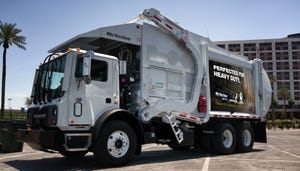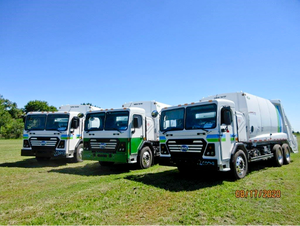Climbing Up: The Recycling Career Ladder
December 1, 1996
WORLD WASTES STAFF
San Bernardino's new Recycling Projects Manager discusses the challenges of municipal recycling.
In October 1996, Lynn Merrill was promoted to the newly-created position of recycling and environmental projects manager for San Bernardino, Calif.
WW: In what ways is the municipal recycling coordinator position evolving?
LM: In the early 1990s, when the initial explosion of interest in recycling as an integrated waste management program occurred, the role of the recycling coordinator was that of a program planner and developer. There were few waste diversion models available, limited understanding of what was or wasn't feasible, and almost no markets for any material other than old corrugated cardboard and old newsprint. There also was tremendous resistance by the waste hauling industry.
As programs are implemented and expanded, the coordinator's role has evolved into being an educator and administrator. The emphasis in recycling programs now is in promoting, monitoring and reporting requirements embodied in the various laws and planning documents.
A paradigm shift is underway which focuses on how we view our natural resources and our waste generation habits. We are nearing the completion of the waste management portion of this shift. The end occurred with energy coordinators in the early '80s. Every major city and industry had an energy coordinator who developed conservation programs, conducted audits and promoted energy reduction.
Now, energy conservation is mainstream, and the need for a single position focused on only energy management went away. This same trend towards eliminating recycling coordinators will accelerate in the next five years as jurisdictions achieve mandated diversion goals.
WW: How will the responsibilities of your present position differ from when you were recycling coordinator?
LM: My new responsibilities will embrace those previous duties of the recycling coordinator. I still will be responsible for designing, implementing and promoting recycling and waste management programs.
WW: What are the challenges and goals that you will face in your new role?
LM: I have set a personal goal of developing and implementing policies and procedures which could be used as national models for sustainable community development and integrated environmental management. My biggest challenge will be developing an adequate budget to accomplish the project. With the city's future financial situations somewhat in limbo due to the passage of Proposition 218, I'm going to need to rely on grants and developing new revenue to pay for these programs.
WW: What can be done to help stabilize the recyclables market?
LM: The biggest challenge in the recyclables market is to recognize that recycled products must compete successfully with other, similar products. At the same time, we've got to recognize that the materials collected through the different recycling programs must meet very narrow acceptance standards by the industries that we expect will use it.
Preferences for recyclable materials will help level the playing field as well. Ultimately, we need to recognize that commodities, including recyclables, are going to fluctuate in the market, and those with consistently high quality materials will always find a market.
WW: How do you determine realistic diversion goals?
LM: There must be a balance between the diversion goal and the cost of achieving that goal. The first 25 percent is easy. The next 10 percent will be more difficult and costly. Achieving 50 percent will push the cost curve up, forcing policy makers to reevaluate these diversion goals. While the theoretical limit of diversion is in the 60- to 80-percent range, it's the cost of achieving those goals which will prevent us from reaching it.
The balance point between cost and diversion is somewhere between 35 percent and 40 percent. Beyond that, the public and the decision makers will begin reacting to the steeper cost curve. If we demand too much, we actually may see an increased backlash against recycling, similar to what's already appeared in the national press.
WW: What skills/achievements helped you reach the position you are at today?
LM: I have a bachelor of science degree in environmental sciences and I'm working on my masters degree in public policy.
Prior to going into the municipal sector three years ago, I spent twelve years in the private sector as a consultant, where seizing opportunities was necessary for survival. The municipal sector is just beginning to understand the need to react quickly.
The biggest skill I have developed is the ability to do critical path analysis and realistic goal setting.
WW: What advice can you give to recycling coordinators who would like to expand their present position?
LM: Establish your credibility with your management and city council early on, and develop a knack for understanding the big picture. If you only focus on meeting the diversion goals within your state, and don't look at how everything fits together, you're probably going to be out of a job in five years.
You May Also Like


